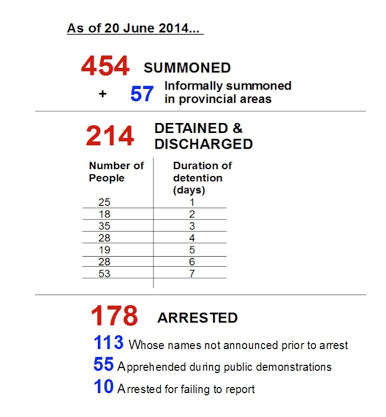Human rights groups expressed worries and concluded that the post-coup human rights situation has been unfavorable at the panel discussion taking place at the Foreign Correspondents’ Club of Thailand on Monday night.
The groups called on the junta to end the Martial Law and embark on transparent judicial procedures with proper human rights principles.
Yaowalak Anuphan, a human rights lawyer from the Thai Lawyers for Human Rights, unveiled recent statistics during the discussion. From 23rd May to 20th June, a total of 450 people have been summoned. Additionally, 57 have been unofficially summoned in provincial areas. 175 were detained after being summoned. 214 were being released. 25 released in a day, 18 in 2 days, 35 in 3 days, 28 in 4 days.
According to Yaowalak, the circumstances of detention have circumvented the boundaries of the law. From the beginning process of detention to the release, the treatment of detainees has been condemned. The arbitrariness involved has incited fear and uncertainty amongst the family members of those rounded up by the junta, she said. A person who reports him/herself will be blindfolded, brought to an unknown location and held captive for as long as 7 days (in some cases even longer), during which, they may be subjected to an ‘Attitude Adjustment’ program.
While the Thai Lawyers for Human Rights has been crunching up numbers and statistics, Sam Zarifi from the International Commission of Jurists stressed for the need to return to a civilian judiciary system. Although he has commended the National Council for Peace and Order (NCPO) for allowing collaboration between different bodies of the civil society, Zarifi emphasized that “civilians should not come before military tribunals.” He calls on the junta ends Martial Law and return protection of rights to detainees.
The request for the junta to conduct trials under the civilian court has been underscored by Dr Nirun Pitakwatchara from the National Human Rights Commission (NHRC).
“Even under Martial Law, there should be a trial under civilian court, not military court, he said, adding that since the coup, the NHRC has acted as a bridge between the detainees, their family members and the NCPO. They have been active in compiling recommendations to the junta and have been conducting negotiations on a case by case basis.
When asked about the effectiveness of the NHRC is influencing policy change, Dr Nirun answered diplomatically, “whether we have influence or not depends on how we work to (compile recommendations)”.



